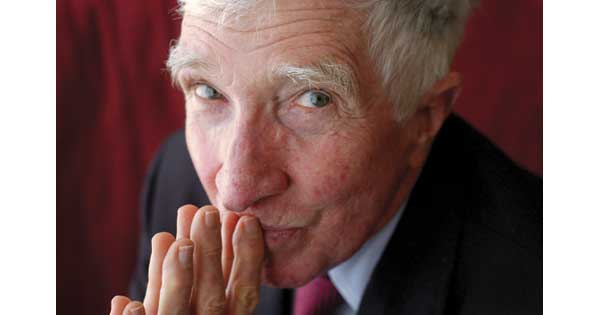The Bard of Suburbia
John Updike’s obsession with ordinary life made him the writer by whom we came to know ourselves

Updike, by Adam Begley, Harper, 576 pp., $29.99
My old teacher Peter Taylor used to say that you had to be ruthless to write fiction—ruthless toward your family and friends, versions of whom you’d use to populate your stories and novels. I never found Taylor to be unkind to anyone, and by late in his life, when I knew him, his fictional characters were mostly based on people long dead. Adam Begley’s Updike underscores Taylor’s point, though. On the evidence of this judicious new biography, John Updike recorded in his fiction the most painful events in his life and the lives of those around him with an alacrity and fidelity approaching the journalistic.
As Begley writes:
Updike hoarded his experience as a husband and father for use in his writing. He observed with intent, monitoring his teetering home life with a loving, greedy eye, precisely aware of its value as material. His undoubted affection was accompanied by an opportunistic urge to make use of what he was witnessing. Conscious of a sliver of inner detachment, a gap between thought and feeling that made surreptitious surveillance possible, he felt guilty about it.
In an interview for the 1982 television documentary What Makes Rabbit Run? Updike’s eldest son, David, acknowledged that his father “decided at an early age that his writing had to take precedence over his relations with real people.” Affection and guilt did fuel Updike’s fiction, giving it—in the case of his flatly autobiographical Maples stories and in the semiautobiographical Rabbit and Bech novels—richness and depth.
Begley demonstrates that Updike, who died in 2009, was more complicated than the twinkly public persona he created for himself, or than his reputation as a suburban bard—John Cheever without the booze and gay sex. Although there was a lot of sex, not gay but giddy in its insatiability. His sexual energies put his family at risk, when he fell first for one woman not his wife and then another. Couples (1968) made Updike famous in a mass-market way, with its tales of a town where the young married set eagerly explored the new sexual freedom made possible by the pill. The short stories he had been writing since moving with his wife Mary and his growing family to Ipswich, Massachusetts, in 1957, had also explored the “feckless carousing” (in Begley’s phrase) in which he had participated.
Updike was hungry in other ways, too—obsessed with his mother and his lost provincial youth, overeager to outshine his competition, famished for a lasting sort of fame. These obsessions and the longings and faults that grew out of them also became the stuff of his fiction. His motivations sometimes expressed themselves in ways that are hard to admire: he was not shy about using the power of The New Yorker, where he started off as a satirist and then for decades was a critic (all the while publishing short story after short story), to enhance his own reputation and tear down those of others—Tom Wolfe and Philip Roth, to name just two.
Yet, for all the detail about his subject’s unpleasant tendencies, Begley does admire Updike, for the same reason that many of us who grew up reading him do: the fiction itself. Updike was a star at Harvard, as both a student and a writer, and soon after graduation The New Yorker first published him and then offered him a job. His elegant and fluid prose (he once said he wrote faster than he read) and his eagerness to take as his subject the ordinary life of his time—these also deserve Begley’s attentive admiration, and our own. And there is Updike’s extraordinary work ethic and output, driven by his determination to be a writer who mattered.
The sheer volume of Updike’s work is a challenge to a biographer, and Begley seems to have mastered not only the more than two dozen novels, the hundreds of stories and poems, the essays, journalism, and criticism, but also a large-enough slice of Updike’s correspondence, for instance with his mother, his New Yorker editor William Maxwell, and his fellow novelist Joyce Carol Oates. Although Begley is not offering literary criticism, he does treat the work clearly and thoughtfully. The autobiographical nature of so much of Updike’s writing can create difficulties, especially in the book’s long first chapter, about his small-town Pennsylvania boyhood, called “A Tour of Berks County,” in which Begley’s movement back and forth from the biographical facts to Updike’s fictional treatment of them can lead to some exasperating repetition.
 Begley records the harsh things writers like James Wood and David Foster Wallace said about Updike late in his career—the former writing, “Updike is not, I think, a great writer” and the latter accusing Updike in 1997 of being, along with Roth and Norman Mailer, in his “senescence.” As for himself, Begley says, “Predicting his eventual place in the pantheon of American literature is an amusing pastime, but no more useful than playing pin-the-tail with the genius label.” Still, I wish he had said more about the influence of Updike’s own criticism when he was not writing about novelists he saw as potential rivals. Updike reintroduced an American audience to the 20th-century British novelist Henry Green (Party Going; Loving) and wrote thoughtful and generous reviews of other novelists from safely distant shores, ranging from John McGahern and William Trevor in Ireland to Christina Stead in Australia, to Wole Soyinka and a raft of other African writers. Any book by Vladimir Nabokov, whom Updike admired and at times emulated, was sure to get his notice. No other American writer of Updike’s stature contributed so much to the literary culture of our time.
Begley records the harsh things writers like James Wood and David Foster Wallace said about Updike late in his career—the former writing, “Updike is not, I think, a great writer” and the latter accusing Updike in 1997 of being, along with Roth and Norman Mailer, in his “senescence.” As for himself, Begley says, “Predicting his eventual place in the pantheon of American literature is an amusing pastime, but no more useful than playing pin-the-tail with the genius label.” Still, I wish he had said more about the influence of Updike’s own criticism when he was not writing about novelists he saw as potential rivals. Updike reintroduced an American audience to the 20th-century British novelist Henry Green (Party Going; Loving) and wrote thoughtful and generous reviews of other novelists from safely distant shores, ranging from John McGahern and William Trevor in Ireland to Christina Stead in Australia, to Wole Soyinka and a raft of other African writers. Any book by Vladimir Nabokov, whom Updike admired and at times emulated, was sure to get his notice. No other American writer of Updike’s stature contributed so much to the literary culture of our time.
Even if fixing Updike’s place in the firmament is only an amusing and useless pastime, it is hard to resist. I suspect that readers down the years will return to Updike as we do to Balzac, not for the single masterpiece, perhaps, but for the cumulative power of his close attention to his world (“he was enthralled by the detail of his own experience,” as Begley gracefully puts it). His productivity, and the facility with which he wrote, made some of his contemporaries grow weary. His ambivalence about the Vietnam War and his male characters’ too-believable myopia about women irritated many others. But a hundred years from now, his faultless prose, his glittering intelligence, his mostly affectionate wit, his polymorphous amorousness, and yes, his affection and regret will make him the writer by whom our lives are known.


